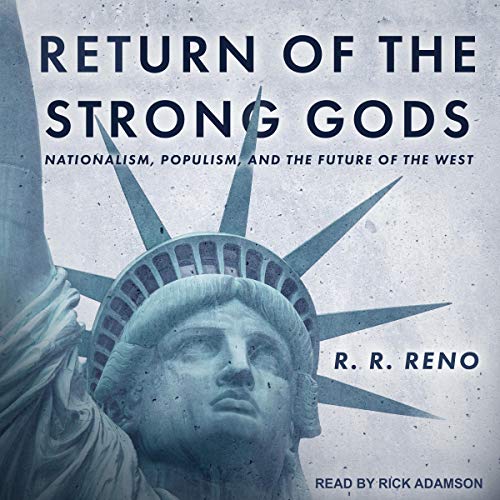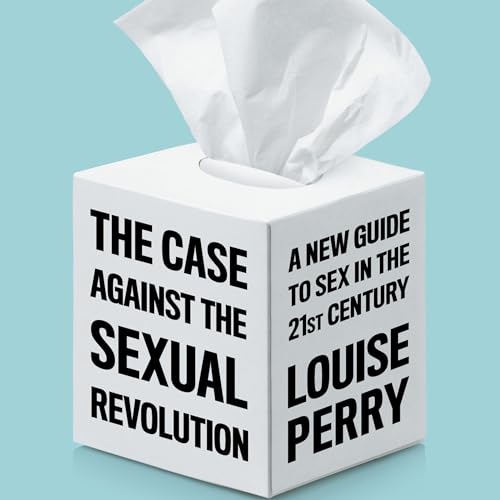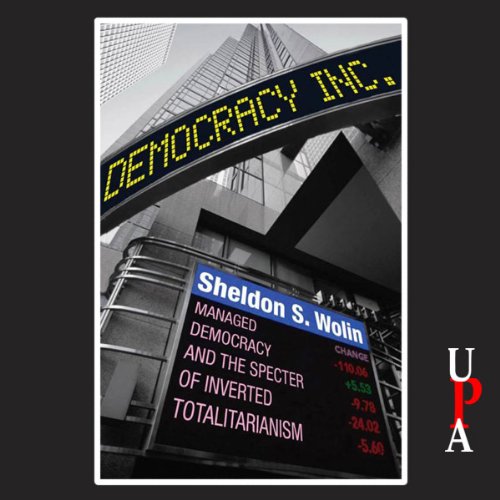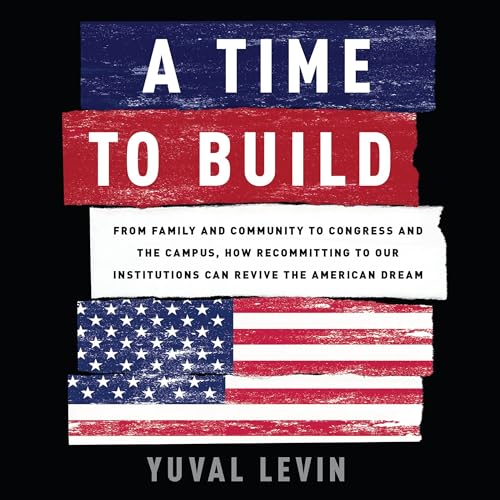$0.99/month for 3 months
$0.99$0.99
- Limited-Time Offer: Get Audible Premium Plus for $0.99 a month for the first 3 months.
- You'll receive 1 credit a month to pick ANY title from our entire premium selection to keep forever (you'll use your first credit now).
- You'll also get UNLIMITED listening to select audiobooks, Audible Originals, and podcasts.
- After 3 months, $14.95$14.95 /mo. Cancel online anytime.
 Your audiobook is waiting!
Your audiobook is waiting!
Enjoy a free trial on us
$0.00$0.00
- One credit a month to pick any title from our entire premium selection to keep (you’ll use your first credit now).
- Unlimited listening on select audiobooks, Audible Originals, and podcasts.
- You will get an email reminder before your trial ends.
- $14.95$14.95 a month after 30 days. Cancel online anytime.
One-time purchase:
-12% $17.46$17.46
 Preview
Preview Why Liberalism Failed
 Audible Audiobook
– Unabridged
Audible Audiobook
– Unabridged
Has liberalism failed because it has succeeded?
Of the three dominant ideologies of the 20th century - fascism, communism, and liberalism - only the last remains. This has created a peculiar situation in which liberalism's proponents tend to forget that it is an ideology and not the natural end-state of human political evolution. As Patrick Deneen argues in this provocative book, liberalism is built on a foundation of contradictions: It trumpets equal rights while fostering incomparable material inequality; its legitimacy rests on consent, yet it discourages civic commitments in favor of privatism; and in its pursuit of individual autonomy, it has given rise to the most far-reaching, comprehensive state system in human history.
Here, Deneen offers an astringent warning that the centripetal forces now at work on our political culture are not superficial flaws but inherent features of a system whose success is generating its own failure.
- Listening Length6 hours and 43 minutes
- Audible release dateMay 22, 2018
- LanguageEnglish
- ASINB07CCZ2TSF
- VersionUnabridged
- Program TypeAudiobook
People who viewed this also viewed
- Audible Audiobook
- Audible Audiobook
- Audible Audiobook
- Audible Audiobook
- Audible Audiobook
People who bought this also bought
- Audible Audiobook
- Audible Audiobook
- Audible Audiobook
- Audible Audiobook
- Audible Audiobook
Related to this topic
- Audible Audiobook
- Audible Audiobook
- Audible Audiobook
- A Time to Build: From Family and Community to Congress and the Campus, How Recommitting to Our Institutions Can Revive the American Dream
 Audible Audiobook
Audible Audiobook - Audible Audiobook
Product details
| Part of series | Politics and Culture |
|---|---|
| Listening Length | 6 hours and 43 minutes |
| Author | Patrick J. Deneen |
| Narrator | Brian Holsopple |
| Audible.com Release Date | May 22, 2018 |
| Publisher | Audible Studios |
| Program Type | Audiobook |
| Version | Unabridged |
| Language | English |
| ASIN | B07CCZ2TSF |
| Best Sellers Rank | #20,313 in Audible Books & Originals (See Top 100 in Audible Books & Originals) #20 in Political Philosophy (Audible Books & Originals) #46 in Conservatism & Liberalism #48 in Political Science History & Theory |
Customer reviews
Customer Reviews, including Product Star Ratings help customers to learn more about the product and decide whether it is the right product for them.
To calculate the overall star rating and percentage breakdown by star, we don’t use a simple average. Instead, our system considers things like how recent a review is and if the reviewer bought the item on Amazon. It also analyzed reviews to verify trustworthiness.
Learn more how customers reviews work on AmazonCustomers say
Customers find the book profoundly insightful and filled with valuable information about liberalism. The writing style receives mixed feedback - while some find it readable and engaging, others note it's not an easy read for Americans. The book receives mixed reactions regarding its thought process, with some finding it thoughtful while others describe it as pretentious.
AI-generated from the text of customer reviews
Select to learn more
Customers find the book profoundly insightful and scholarly, providing valuable information and presenting a great analysis.
"...Bottom line: a thoughtful book, largely but not exclusively conservative in its thrusts, arguing for a new localism, a new agrarianism and perhaps..." Read more
"...It is based on the studies of various pollical philosophers including Plato, Aristotle, Niccolo Machiavelli, Thomas Hobbes, Francis Bacon, John Locke..." Read more
"...ways deeply in keeping with Weber's work, made readable and historicized for our epoch and for classical liberalism as a particular case or instance..." Read more
"...Deneen’s readable, yet scholarly, presentation and elaboration of this brilliant insight has my highest recommendation.`" Read more
Customers find the book engaging and enjoyable to read.
"...It is always provocative and it would make a great 'common read' for newly-matriculated college students..." Read more
"Incredible book that I feel explains so much about the current political climate we find ourselves in today. Great read." Read more
"...and political insights it offers which at times in the book make for a novel and worthy critique of liberalism." Read more
"Many of the points in this book are very good and illustrate a lot of the issues currently in our country...." Read more
Customers have mixed opinions about the readability of the book, with some finding it readable and concisely articulated, while others note it is not an easy read for Americans and poorly written.
"...In part, this is what makes this book, while readable, difficult to fully understand...." Read more
"...That is, liberty as it was classically understood is oppressive, officious, and holds back those individuals who, though in the minority, ought to..." Read more
"...have here is in many ways deeply in keeping with Weber's work, made readable and historicized for our epoch and for classical liberalism as a..." Read more
"...The author is unconvincing. Much of the book is written in a humanistic, non-empirical style, with lots of language about virtue and the glories of..." Read more
Customers have mixed reactions to the book's thought process, with some finding it thoughtful while others describe it as dull.
"...points toward solutions for how to restore vibrancy in culture, dignity in work-life, and justice and order in society...." Read more
"...In so doing, we erect and empower a cold, impersonal structure, beset by paradoxes and every bit as ungainly and uncomfortable as the contradictions..." Read more
"...without question that pillar of all that is good and true and worthy of human esteem. Yet it’s rotten at its core...." Read more
"Well reasoned portrait of the shortcomings of both “classic” and “progressive” liberalism...." Read more
Customers have mixed views on the book's approach to liberalism, with some appreciating its analysis of the failing ideology, while others express concern about its negative impact on culture and freedom.
"This is an important book, but it is a book on political theory/history with the emphasis on the theory...." Read more
"...But the dominating message is “Liberalism failed, Liberalism failed because of Liberalism, and Liberalism cannot fix itself.”..." Read more
"...inadequate liberty and (at the same time, paradoxically) inadequately protected rights, in no small part due to the ever-ballooning and overwhelming..." Read more
"...Deneen instead makes the claim that liberalism has wholly failed...." Read more
Top reviews from the United States
There was a problem filtering reviews. Please reload the page.
- Reviewed in the United States on August 28, 2020This is an important book, but it is a book on political theory/history with the emphasis on the theory. Political theory or political philosophy has a tendency to become too abstract. This is compounded by the fact that its key terms are endlessly debated (just like the key terms of other branches of philosophy). Hence, we need lots of concrete examples to keep us on the straight and narrow and to keep the argument clean and clear. Here there are a number of examples but never enough for me. I had to focus very carefully on individual sentences and paragraphs to insure that I knew what, precisely, he was saying. Even then there were points at which the reasoning became hazy.
The overall argument is straightforward. Both modern and classical liberalism are about liberty but they are about radically different ideas of liberty. In antiquity (and for much of western thought) liberty turns on virtue. To be free and to enjoy liberty is to have control of one's appetites. Otherwise, you are enslaved by those appetites, desires and drives. That means constraining yourself and disciplining yourself. We receive help in this process from institutional structures and cultural traditions. 'Mores' and customs—so important, e.g., for Tocqueville play an important role here. Modern (i.e. post 17th-c) liberalism is just the opposite. It entails the ability to pursue all of one's desires and it is, basically, license. This is the liberalism that has failed us and the unchained sexuality which it promotes has taken us to Sodom and Gomorrah, not to utopia and certainly not the city of God. In combination with the satisfaction of other material desires (basically, consumerism) we have found ourselves within a soulless society where individuals are lonely and wracked by anomie and alienation. So long as we pursue this course we will become increasingly frustrated, lonely and lost. Since the human imagination (as Samuel Johnson pointed out) can always conceive of more and more things to be desired we can never really be satiated. For Johnson we must find our stability in the truth and in faith, recalling Augustine's famous comment that our hearts are restless until they rest in God.
The most active area for modern liberalism has been the area of sexuality (always the first chain to be cast off, as Blake notes) and it has left us with a world of pornography, delayed or disregarded family formation, out-of-wedlock births, and so on. The world of the hookup is a lonely one.
Related to the 'liberation' with regard to sexuality is the desire to control nature. Men who feel as if they are women can actually attempt to become women. The author locates the beginning of this process with Bacon (very important for the progressive liberal, Dewey) who advocates the control and exploitation of nature. This is ultimately in conflict with human nature, the author argues, and he looks instead to a writer like Wendell Berry who traces many of our social ills to our detachment from nature. This control of nature/modern liberalism connection is probably the least developed section of the book, though many points are made. The author is very concerned, e.g., about global warming and the despoiliation of nature and sees it in parallel with the endless indebtedness incurred by the government to satisfy our desires for instant gratification and to keep any thoughts of sacrifice or personal discomfort at a distance.
He sees Mill as another principal culprit in the development of modern liberalism and argues that the founding fathers were themselves complicit in ultimately arguing for a strong central government which would be distant from the people and undercut the kinds of local associations that were so important to Tocqueville and his understanding of the essential American character. Many would dispute this particular argument (re: the founders and the Federalist papers), but he develops it in some detail.
Bottom line: a thoughtful book, largely but not exclusively conservative in its thrusts, arguing for a new localism, a new agrarianism and perhaps even for a new Benedictine model (via Rod Dreher). It is always provocative and it would make a great 'common read' for newly-matriculated college students (though its very title would doubtless disqualify it, despite the nuanced nature of the argument).
Highly recommended.
- Reviewed in the United States on May 28, 2019This book takes a while to get your head totally around it. But the dominating message is “Liberalism failed, Liberalism failed because of Liberalism, and Liberalism cannot fix itself.”
In the United States today, we use the word “Liberal” to mean the Progressive Liberals. But this is not what Professor Deneen means: Liberalism includes both the “Conservatives” and “Liberals!” Both Conservatives and Progressives are the opposite sides of the coin called Liberalism. To understand this, we need a definition of what Liberalism is in Deneen’s usage.
Deneen’s definition is, “Liberalism … is understood to be the greatest possible freedom from external constraints, including customary norms. The only limitation on Liberty, in this view, should be duly enacted laws consistent with maintaining order of otherwise unfettered individuals. Liberalism thus disassembles a world of customs and replaces it with promulgated laws.” (italics in the original) From the Preface to the Paperback Edition. Whereas the Conservatives insist on the liberty to free the individual man through opportunity to access free markets globally, the Progressives insist liberty to free the individual man through economic and social equality.
The three major ideologies of the world are Communism, Fascism, and Liberalism. Francis Fukuyama in the 1989 essay, “The End Of the World,” used Hegel’s definition of the end of the world where all ideologies would finally be resolved into the only and correct one. He declared the End of World when Liberalism successfully stood alone in the world after the flaws were exposed of both Communism and Fascism lead to the destruction of states based on those ideologies. Much of this book is a refutation of Fukuyama's premise. I think a reader would have difficulty understanding what Deneen is arguing against without having read Fukuyama.
The founders of the United States built a republic based on a philosophy of Classical Liberalism. Today, a solid majority of Americans believe that the United States has and is moving in the wrong direction. Nearly every premise of Classical Liberalism has been destroyed through the construction of the government of the United States as it exists today. There is almost no aspect of human life for an American that isn’t somehow impacted by the US government, and most Americans feel that they are powerless to change the situation. Liberalism promised the limitation of government and the liberation of the individual from arbitrary political control. Liberalism has produced just the opposite of what Liberalism initially promised. This is part of the evidence of why Professor Deneen claims Liberalism failed.
According to Deneen, Liberalism ultimately fails because it has a false concept of human nature which results in the state growing through its agencies removed from the electorate, the regulations enforce the removal of some constraint on freedom (in itself an oxymoron,) and the laws imposed to create human equality. In politics, government, economics, education, and technology, Liberalism is bankrupting freedom. Liberalism gives the citizens of the United States politicians that have no power other than figureheads of the nation, a massive government structure, an economic system borrowing on the future with debts to be paid by our grandchildren left with a supposed plan, “they will figure it out,” an educational system that rejects the history of the world including the United States while providing a “servile” education to placate the needs of the economic and technologic systems and rejecting the study of its own culture, and a technology system that uses massive amounts of resources, unbounded by the loss of morals and virtues of the US citizen while trying to fill the unsatisfiable appetites for more by the peoples. (“WOW: A long sentence for me but well documented in Deneen’s analysis.) A conclusion is drawn by Deneen and I agree with it: Liberalism is unsustainable!
Deneen then builds his argument supporting these conclusions by examining what the various political philosophers had observed and proposed. Then, he comparing the outcomes of the growth of the state, the construction of the free market, the destruction of the culture of the United States, the effects of technology and the loss of freedoms as a result of technology, the destruction of an educational system that allowed critical thinking and introspection of Liberalism while fostering a false sense of value to STEM education, the building of an elite aristocracy cutoff from the electorate, and the loss of freedom for the citizenship.
So where does this all lead? What comes after Liberalism? The scions of the slaves produced under Liberalism will produce populist movements and revolution. There may be hope for a new ideology that is better, but it is more likely that this will lead to authoritarianism: It has in the past: one only needs to look the probability of where past revolution produced. To avoid these grim outcomes, Deneen suggests that we need to engage in the negotiation between the Utopia and the realistic as was initiated by Plato. We need to acknowledge what Liberalism achieved and have the desire to eschew a return to a “preliberal age.” We can not go back. We must outgrow the “age of ideologies” and foster a culture of household economics and polis life where the focus is on events near and local to us rather than far away and conducted by the massive, impersonal government(s) which are now the outcomes of Liberalism. And finally, there might emerge a better theory of politics.
Professor Patrick J. Deneen is the David A. Potenziani Memorial College Chair of Constitutional Studies at the University of Notre Dame. This book is erudite and is well referenced. It is based on the studies of various pollical philosophers including Plato, Aristotle, Niccolo Machiavelli, Thomas Hobbes, Francis Bacon, John Locke, John Stuart Mill, Immanuel Kant, Jean-Jacques Rousseau, James Madison, Alexander Hamilton, John Jay, Alexis de Tocqueville, Edwin Burke, Georg Hegel, Karl Marx, John Dewey, Friedrich Hayek and many, many, more. In part, this is what makes this book, while readable, difficult to fully understand. While almost all readers will come away from this book with an appreciation for the argument Deneen is making, I doubt anyone unfamiliar with the major arguments of these philosophers will understand Deneen’s logic. While I consider myself well read in Philosophy, I found myself referring back to original sources to comprehend Deneen’s arguments. Of most importance, in my opinion, was the concept of “freedom” from Hegel’s “Philosophy of History.”
All in all: this book which probably began as a series of essays when taken together, creates a book worth thinking about.
Top reviews from other countries
-
 recluseReviewed in Japan on May 1, 2019
recluseReviewed in Japan on May 1, 20194.0 out of 5 stars みんな同じ穴のムジナ
久しぶりに、政治哲学の本を読む。本書の視点はユニークだ。巷でよく言われる古典的リベラリズム(Classical liberalism)と進歩的リベラリズム(Progressive liberalism)との間に本質的な差はなく、リベラリズム自体に本質的に内在する基本的な前提がその崩壊の原因となっているため、リベラリズムのさらなる推進によっては現代社会の問題に対処することはできないという衝撃的なメッセージが本書のコアだ。
本来libertyには外的な拘束(政治的な専制)からの自由だけではなく、人間に内在する本質的な欲求(その代表的なものが性と金銭)からの自由も含まれているのだが、自己抑制と規律そしてそれらの基盤となる過去の蓄積の産物としての文化への尊厳を欠落させた現在のリベラリズムは結果として醜悪な病理的な様相を示しており、自己崩壊の道をたどっているというわけだ。著者は人間を関係的な創造物(relational creatures)つまり社会的・政治的な動物ととらえている。一方で、現代のリベラリズムの下では、過去の時間や未来への想像力、そして自然の拘束から切り離された個人(自然状態)がその自律的な選択により「契約」を結び社会を形成していくというフィクションを前提としている。まっさらな個人の自由な選択による現在というフィクションが大手を振るって歩いているわけだ。この考えの延長線上には、人間は自然科学により自然を征服できるし、究極的には欲求の束ともいうべき人間性自体をも変えることができるし、変えるべきだという傲慢ともいうべき進歩信仰の人間観がリベラリズムの核心なのだ。この論理的な帰結は自然破壊と遺伝子工学であることは言うまでもない。
現実の人間の欲求は性的(sex)なものと経済的(profit)なものに大別されるが、これらへの自己抑制や文化的な拘束を否定した現代のリベラリズムは、必然的に放蕩と腐敗に陥り、市場の肥大化をもたらし、そこでは社会の不平等が拡大し、結果として国家の肥大化が共に進むというわけだ。つまり著者の議論の下では国家と市場は対峙されるのではなく、リベラリズムの下ではその両者の役割は拡大し、その結果としてアメリカの草の根の民主主義は窒息死されているというわけだ。このリベラリズムと現実の乖離との関連で詳しく引用されるのが、トクヴィルの「アメリカの民主政治とアメリカ建国の父たちによる「Federalist Papers」なのだが、この両者とも日本人にはあまり縁のない古典だ。
前半の明晰さと比較して後半がどうもわかりにくい。「地方政治は民主主義の学校」というのはトクヴィルの言だが、議論にはcivic culture, civic societyやcitizenshipそして地域社会などの用語が出てくるが、このある意味で翻訳不可能な言葉が前面に出てくる部分が一番理解しにくい部分だろうか。
 Pierre ProulxReviewed in Canada on January 27, 2025
Pierre ProulxReviewed in Canada on January 27, 20255.0 out of 5 stars Ok
Ok
 Mick McManusReviewed in Australia on December 30, 2023
Mick McManusReviewed in Australia on December 30, 20235.0 out of 5 stars Understanding the infectious disease inflicting the West: Modern Liberalism
Great book that goes to the heart of why the West is floundering. It provides a road map to the excesses of the Trump administration and simultaneously explains why identity politics and anti-religious trends are tilting society in a dangerous direction. We have entered a space where the mad left and mad right are destroying society. This book provides an intellectual framework to understand who we are, and posits how modern liberalism is insolvent.
 afortlReviewed in Mexico on August 11, 2019
afortlReviewed in Mexico on August 11, 20195.0 out of 5 stars Excelente
Excelente
 Amazon CustomerReviewed in the United Kingdom on July 2, 2020
Amazon CustomerReviewed in the United Kingdom on July 2, 20205.0 out of 5 stars A troubling and prescient read
Whether you agree with the book's recommendations or not, it's clear to see how liberalism (as in, the favouring of the individual over the community) has led to the precarious state we find ourselves in now. This is an interesting book that lays out how both sides of our current political debate are proponents of liberalism, and engaging with either will only serve to entrench our current economic inequality. This is a book I would recommend for anyone, of any political persuasion, to read to get a striking diagnosis of where things went wrong.






















